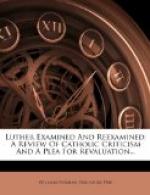No Protestant regards Luther as Catholics regard Mary, not even Patrick. Luther has taught them too well for that. Unwittingly the Catholics themselves have immortalized Luther by naming the Evangelical Church after Luther. Luther declined the honor. “I beg,” he said, “not to have my name mentioned, and to call people not Lutheran, but Christian. What is Luther? The doctrine is not mine, nor have I been crucified for any one. . . . The papists deserve to have a party-name, for they are not content with the doctrine and name of Christ; they want to be popish also. Well, let them be called popish, for the Pope is their master. I am not, and I do not want to be, anybody’s master.” (10, 371.)
It is likely that the frequent laudatory mention of Luther’s name, especially in connection with the present anniversary of the Reformation, is taken as a challenge by Catholics. If it is that, it is so by the choice of Catholics. It is impossible to speak of a great man without referring to the conflicts that made him great. “He makes no friend,” says Tennyson, “who never made a foe.” “The man who has no enemies,” says Donn Piatt, “has no following.” Opposition is one of the accepted marks of greatness. The opposition which great men aroused during their lifetime lives after them, and crops out again on a given occasion. This is deplorable, but it is the ordinary course. Moreover, it is possible that in a season of great joy like that which the Quadricentenary of the Reformation has ushered in orators and writers may fail to put a due check on their enthusiasm and may overstate a fact. Such things happen even among Catholics, we believe, But they will be negligible quantities in the present celebration. The proper corrective for them will be provided by Protestants themselves. The vast majority of those who have embraced the spiritual leadership of Luther in matters pertaining to Christian doctrine and morals will prove again that they are in no danger of inaugurating man-worship. The spirit of Luther is too much alive in them for that. They will, with the Marquis of Brandenburg, declare: “If I be asked whether with heart and lip I confess that faith which God has restored to us by Luther as His instrument, I have no scruple, nor have I a disposition to shrink from the name Lutheran. Thus understood, I am, and shall to my dying hour remain, a Lutheran.” They will ever be able to distinguish between the man Luther, prone to error and sin like any other mortal, and the Luther who fought the battle of the Lord and had a mission of everlasting import to the Church and the world. They have shown on numerous occasions that they can be friends of Luther, and yet criticize him or dissent from him. If they had not, there would be no Protestants whom Catholics can quote as “opponents” of Luther. On the other hand, if any one undertakes to enlighten the public with a view of Luther, Protestants will insist that his estimate comport with the facts in the case, and that the name of a great man who deserves well of posterity be not traduced. Why, even the Catholic von Schlegel thinks Luther has not been half esteemed as he ought to be.




